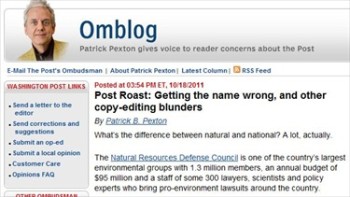
Washington Post public editor Patrick Pexton criticized the newspaper for frequent errors.(Credit: Washington Post, screenshot)
Washington Post public editor Patrick Pexton, in an Oct. 18 blog post, slammed the Post for errors in its recent reporting.
For example, Pexton cited the Post’s error in calling the Natural Resources Defense Council the National Resources Defense Council in three instances in an October 2011 story. The name of the council isn’t obscure, according to Pexton, who commented that the council’s frequency in reports on “energy or the environment” in Washington D.C. warrants adding it to “a basic copy editing test for anyone working at The Post.”
According to Pexton, the error was made by the reporter and made it past two editors. It was corrected within a matter of days, however. The story “was published online Friday with the errors, appeared in Sunday’s print edition, still containing the errors, and was finally corrected online Monday and in print Tuesday.”
Pexton attributed the errors to a shortage of editors, more content, more forms of publication, and other realaties of the 24/7 news cycle. According to Pexton, “copy editing mistakes are among the most frequent complaints to the ombudsman.”
The Washington Post’s Erik Wemple commented that Pexton’s blog post “earns his pay,” but suggested that if most complaints to Pexton are copy-editing errors, perhaps things aren’t that bad.
“From where I sit, that’s a sign of journalistic good health, at least in the year 2011. Wouldn’t it be far worse if other categories of mistakes and nastiness were “among the most frequent complaints to the ombudsman?”
“Think about it: What if ‘rampant sexism among both male and female columnists”’ were among the most frequent complaints to the ombudsman? What if plagiarism or quote fabrication were among the most frequent complaints to the ombudsman? What if political bias were among the most frequent complaints to the ombudsman? “
However, while Pexton may say that errors are his most frequent complaints, StinkyJournalism notes that plagiarism has been a hot issue this year. In 2011, Pexton has addressed publicly three cases of plagiarism. Last month, Pexton wrote about University of Texas professor Nathan Ensmenger’s claims that freelancer Anna Lewis plagiarized from his work for her essay in the Washington Post. In May, Pexton disclosed that the Post fired freelancer Robert Rigney for plagiarizing from a documentary movie called Absolut Warhola. And, in March, Pexton weighed in on the Post’s suspension of Pulitzer Prize-winning staff member Sari Horwitz, who had plagiarized from the Arizona Republic.




